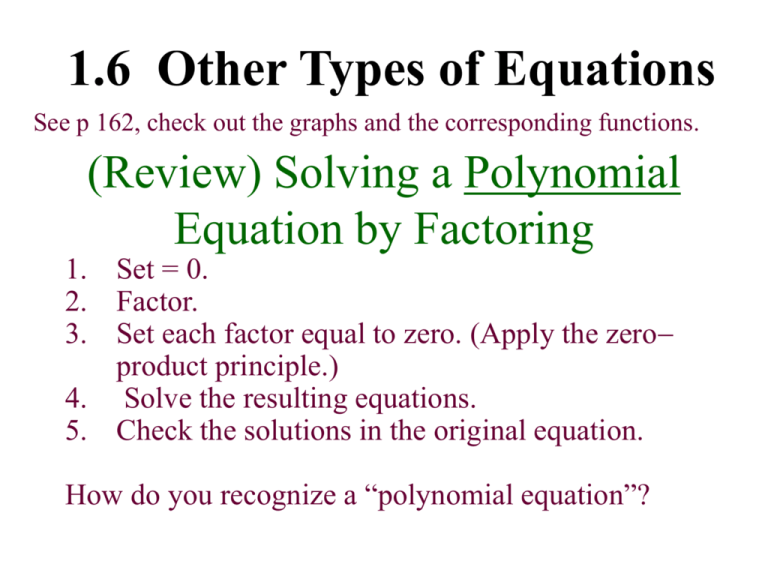SOLVE the resulting equation
advertisement

1.6 Other Types of Equations See p 162, check out the graphs and the corresponding functions. (Review) Solving a Polynomial Equation by Factoring 1. Set = 0. 2. Factor. 3. Set each factor equal to zero. (Apply the zeroproduct principle.) 4. Solve the resulting equations. 5. Check the solutions in the original equation. How do you recognize a “polynomial equation”? Text Example Don’t look at notes, no need to write. • Solve by factoring: 3x4 = 27x2. Step 1 Move all terms to one side and obtain zero on the other side. Subtract 27x2 from both sides 3x4 - x2 = 27x2 - 27x2 3x4 - 27x2 = 0 Step 2 Factor. 3x4 - 27x2 = 0 3x2(x2 - 9)= 0 Solution cont. • Solve by factoring: 3x4 = 27x2. Steps 3 and 4 Set each factor equal to zero and solve each resulting equation. 3x2 = 0 or x2 - 9 = 0 x2 = 0 x2 = 9 x = 0 x = 9 x=0 x = 3 Steps 5 check your solution If time: p 160 #6 x 1 = 9x 9x 3 2 (Rvw.)Solving RADICAL Equations “IRS Audit” • ISOLATE the radical • RAISE each side to the same power (match the index) • SOLVE the resulting equation • “AUDIT” (check), especially if raised to an EVEN power. (ex: \/x = -2) Ex: Solve: x -3 7 = 9 Isolate Raise Solve “Audit” Why do we need to know this? Ex: p162#111 y = 5000 100 - x Ex: Solve: Isolate Raise Solve “Audit” 3 x x -5 = 8 Solving Radical Equations of the Form xm/n= k • Assume that m and n are positive integers, m/n is in lowest terms, and k is a real number. 1. ISOLATE the expression with the rational exponent. 2. RAISE both sides of the equation to the n/m power. 3. SOLVE the resulting equation. Solving Radical Equations of the Form xm/n= k cont. If m is even: If m is odd: xm/n = k xm/n = k (xm/n) n/m = ± kn/m (xm/n)n/m = kn/m x = ±kn/m x = kn/m It is incorrect to insert the ± when the numerator of the original exponent is odd. An odd index has only one root. 4. “AUDIT” all proposed solutions in the original equation to find out if they are actual solutions or extraneous solutions. Text Example (No need to write, don’t look at notes.) Solve: x2/3 - 3/4 = -1/2. Isolate x2/3 by adding 3/4 to both sides of the equation: x2/3 = 1/4. Raise both sides to the 3/2 power: (x2/3)3/2 = ±(1/4)3/2. (The square root of ¼ is ½, cubed is 1/8) (Note: WE take the square (even) root, so we use +/-) 3 2 x = ±1/8. (Do p 160 # 34: ( x 5) = 8 ) Equations That Are Quadratic in Form Some equations that are not quadratic can be written as quadratic equations using an appropriate substitution. Here are some examples. Given Equation Substitution New Equation x4 – 8x2 – 9 = 0 or (x2)2 – 8x2 – 9 = 0 5x2/3 + 11x1/3 + 2 = 0 or 5(x1/3)2 + 11x1/3 + 2 = 0 t = _______ t2 – 8t – 9 = 0 t = ________ 5t2 + 11t + 2 = 0 Hint: put the trinomial in descending order, use the variable part of the 2nd term as t. Square it to see if it works for the variable part of the first term. *** Don’t forget to SUBSTITUTE BACK! *** Do p 160 # 46 2 x - 7 x - 30 = 0 (Rvw.)Rewriting an Absolute Value Equation without Absolute Value Bars • If c is a positive real number and X represents any algebraic expression, then |X| = c is equivalent to X = c or X = -c. • (Using numbers: |2| = 2, and |-2| = 2, so if |x| = 2, that means that x = 2 or x = -2) •* IMPORTANT* To apply this, we must ISOLATE the absolute value part before setting up cases and dropping the bars. Example (Don’t look at notes, no need to write.) Solve: Answer: 3x - 1 = 4 3x-1 = 4 3x = 5 x = 5/3 and 3x-1 = -4 3x = -3 x = -1 Do on board: Solve | 1 – x | -7 = - 4 and | x + 2|+7 = 3 (Solve: ) 3x 7 -1 = 6 2




